Duct cleaning scams: how to spot and avoid them
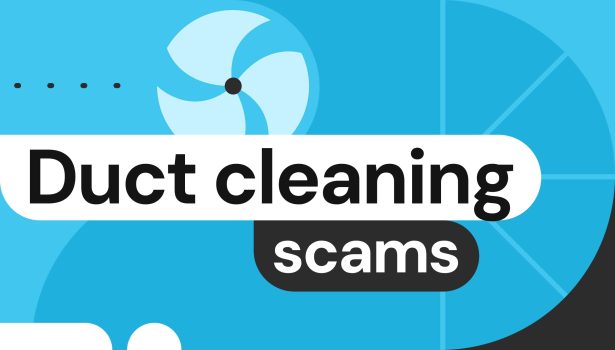
Air duct cleaning scams have surged in recent years, especially on Facebook, through cold calls, and on fake websites. Scammers often target people right after obtaining their contact details from online ads, public posts on social media, or purchased data lists from data brokers.
The pitch usually sounds simple and promising—”Fresh, clean air in your home for just $49!” But behind these offers are deceptive tactics designed to overcharge you, collect your personal information, or steal your money without delivering anything.
This type of home maintenance scam is on the rise, which is why we put together this guide to help you recognize and avoid vent cleaning scams in their many forms.
What are duct cleaning scams?
Duct cleaning scams are fraudulent offers of air duct cleaning services. Often advertised or promoted on social media, in local community groups, or through cold calling, these offers may start online but can move offline, with scammers coming to your home to “inspect” and “deliver” their services.
In reality, the perpetrators only pose as legitimate duct cleaners, but their true goal is to:
- Overcharge for unnecessary services (for example, when your vent doesn’t need cleaning).
- Steal personal information (harvesting details like your home address and banking information during the interaction).
- Deliver poor or incomplete work (after you’ve paid the deposit or even the full sum).
- Steal your money (by demanding advance payment and disappearing after receiving it).
Common duct cleaning scams and how they work
Duct cleaning scams are particularly popular on Facebook, often starting as ads and posts on Facebook Marketplace and in various community and neighbourhood groups. These listings have become so ubiquitous that people are wondering if air duct cleaning has suddenly become a high-demand service everyone needs.
One reason duct cleaner scammers proliferate is that people keep falling for their promises, partly because of the scare tactics bad actors use, such as exaggerated health hazards, and partly because of the attractively low price tag. These tactics, however, lead to a variety of ways scammers exploit their targets, as described below.
Bait-and-switch pricing
This type of scam usually starts online via social media ads and unsolicited calls or emails, with scammers advertising an unbelievably low duct cleaning price (such as $29 for a vent or $99 for an entire house).
When the “technician” arrives, they claim to find extra problems—like mold, clogged ventilation, or shaky construction—pushing you to approve costly add-ons to the original cleaning service. The final bill can end up being hundreds or even thousands of dollars more than initially agreed.
Tip to avoid the scam: Get a detailed written estimate before the service begins, and make sure it includes all potential charges.
Blow-and-go cleanings
Blow-and-go cleanings are often advertised through fraudulent Craigslist listings or as part of Facebook Marketplace scams, and are booked through direct messages with unsuspecting victims. The scammers behind dryer vent cleaning scams promise full-sweep duct cleaning but only perform minimal vacuuming of a vent, skipping most of the system. They may leave dust and debris untouched but charge for a full-scale service, sometimes throwing in extra add-ons while only pretending to do the work.
Tip to avoid the scam: Agree on your service approval terms upfront, including requiring before-and-after photos of every cleaned section before paying or documenting everything yourself. In most cases, unscrupulous duct cleaners will reject your requirements or stop communicating.
Fake mold or health warnings
These scammers hook their targets with “free quote” Facebook ads or website lead forms, promoting the low price and health benefits of duct cleaning. After arriving for this low-cost service, perpetrators claim they’ve found “dangerous mold” or other health hazards inside your duct. They pressure you into expensive remediation services on the spot, such as applying biocides, when in reality this “mold” may just be dust or even non-existent.
Tip to avoid the scam: Never approve mold treatment or other chemical procedures on your vent system without lab-verified testing from an independent, reliable contractor.
Misleading company credentials
Fraudsters create social media pages or paid ads with stolen logos, fake “licensed” badges, and invented credentials to appear legitimate, such as claiming to be certified members of NADCA (National Air Duct Cleaners Association). They may link to a convincing yet fake website with random office addresses that can’t be found on Google or verified otherwise. If booked, they deliver subpar work or even disappear after receiving the deposit.
Tip to avoid the scam: Verify company credentials and licenses through your local licensing board or organizations such as NADCA and the Better Business Bureau. It also helps to reverse-search the images they use and look up their official address—in some cases, it may be a residential building.
Facebook lead ads & cold calls
You may come across Facebook lead ads, fake “instant quote” popups, or receive cold calls from scammers with unsolicited duct cleaning offers. In fact, these scams are less about cleaning and more about harvesting your personal data. For example, spoofed phone calls and Facebook lead forms may collect your full name, home address, and phone number, which can then be sold to telemarketers or other scammers.
Tip to avoid the scam: Avoid filling out service quote forms on unfamiliar sites and social media pages. Instead, contact reputable duct cleaning providers directly using their official contact numbers.
Vent cleaning subcontract scams
Some Facebook community posts or online ads may advertise cheap vent cleaning services by Company A, but if you book them, they will send Company B—or unknown subcontractors with no verifiable professional credentials. If you pay in advance, they may deliver part of the work and leave it unfinished.
Tip to avoid the scam: Verify the company you’re about to deal with independently, and only pay after the work is complete and you’re satisfied with its quality.
Common red flags of duct cleaning scams
The warning signs are often hiding in plain sight, but they become easier to spot once you know what to expect. Here’s a summary of the most telling red flags of vent cleaning scams that start online or via cold calling:
- Unrealistically low prices. You may see a Facebook post advertising whole-house duct cleaning for $29, only to discover the price going up in the first five minutes of the “technician’s” visit. Once they arrive, they will claim unexpected problems with your vent system and pressure you into buying expensive add-ons to fix them.
- A mystery company. There are no physical addresses or company licenses listed online, with no independent customer reviews on Google Maps or business directories. If you press them for details, they’ll give you vague answers or a link to a generic website for a company named “Duct Cleaners” or something similar.
- Pushy sales calls and DMs. This aggressive outreach often relies on scare tactics and fearmongering (“This mold could kill a family!”) as well as urgency (“Book the last slot left for this month!”).
- Stock photos. Visuals can give duct cleaning scammers away. Many use generic photos of spotless ducts, smiling technicians, and happy homeowners, but these photos can be easily found on other websites if you do a quick reverse image search. The branding, if any, will feel copy-pasted, because it is.
- Vague service descriptions. You’ll find only a sketchy, generic description of the service, with no process walkthrough or any technical details. If you ask for a quote, they will provide a clickbait price that’s too low but is likely to skyrocket when they show up at your place. Such listings often contain grammatical mistakes, odd spelling, and unnatural wording.
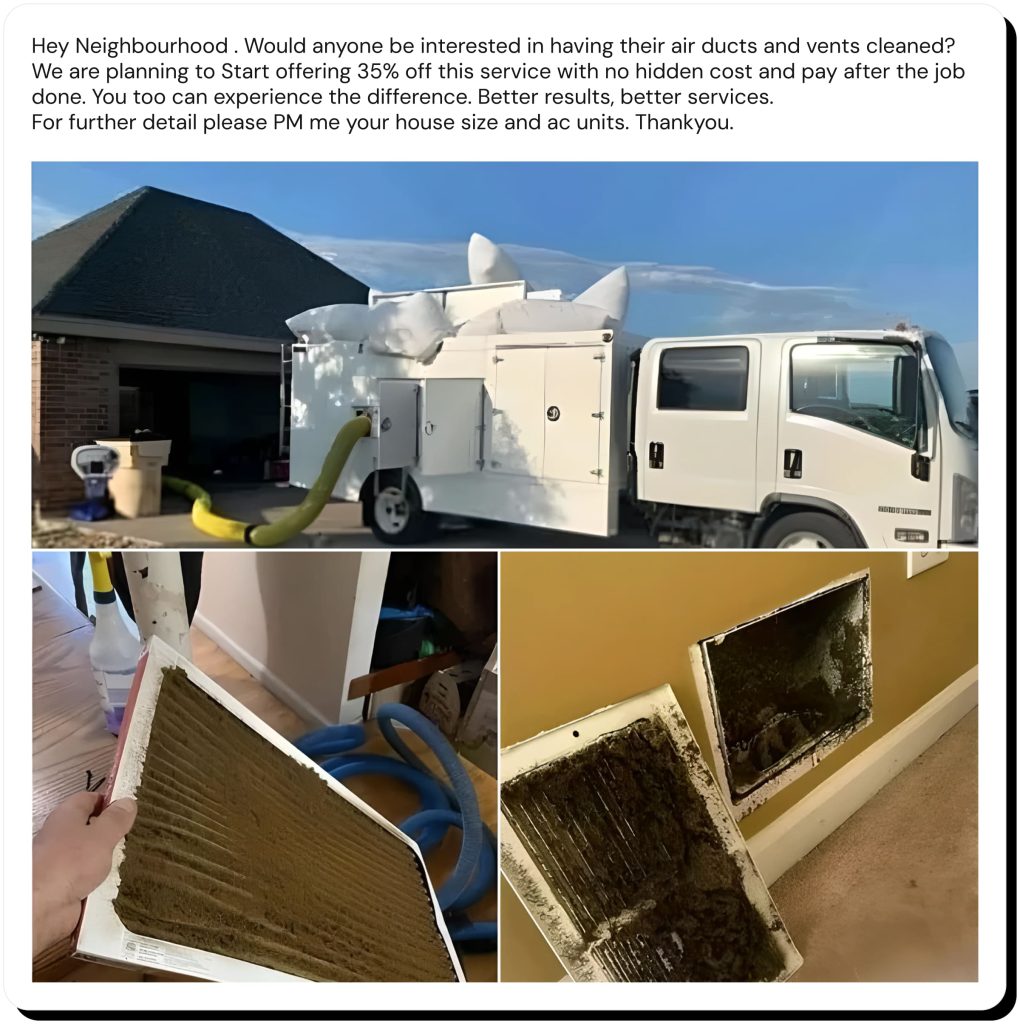
- Requests for upfront payments in cash or gift cards. No legitimate company asks for an advance fee before you even see the work. Trustworthy providers use traceable payment methods with buyer protection, not instant money transfers via Zelle or Venmo.
- Refusal to share real testimonials or proof of past work. This is a major red flag, signalling that it’s most likely a fake company run by scammers. A real company will gladly share reviews, photos of past work, and references from former clients. Scammers dodge such questions or just walk away.
How to protect yourself from duct cleaning scams
Scammers thrive on lack of awareness and human fallibility, especially when it comes to a full-scale service promising tremendous health benefits for just a few bucks. To stay away from unscrupulous duct cleaners, follow these practical safety tips:
- Verify company information online. Search for reviews, verify their contact information, look up the physical address, and check whether their licenses are valid.
- Ask questions. Scammers often pressure their victims into rushed decisions, but you can stop them in their tracks by asking clarifying questions about their “business.” For example, inquire about their liability insurance, warranty, NADCA membership (in the U.S.), and references from local clients.
- Use official business channels. If you’re looking to have your ducts professionally cleaned, do your own research online and reach out to a reputable provider directly.
- Avoid suspicious lead forms and never enter your personal information on websites from Facebook ads or random popups on the internet.
- Don’t click on scammy ads, especially those advertising extremely cheap services in a sensational tone.
- Request everything in writing, such as the terms and conditions of the provided services, potential charges for extras, and service acceptance requirements to have some legal footing to dispute the service quality if necessary.
- Consider removing your personal information from the internet. Scammers scan public data brokers and people-search websites in search of easy targets. Knowing your full name, home address, and phone number is often enough for them to start bombarding you with cold calls and unsolicited duct cleaning offers. Services like Onerep remove personal records from online sources automatically, so scammers can’t abuse your contact details and target you in their schemes.
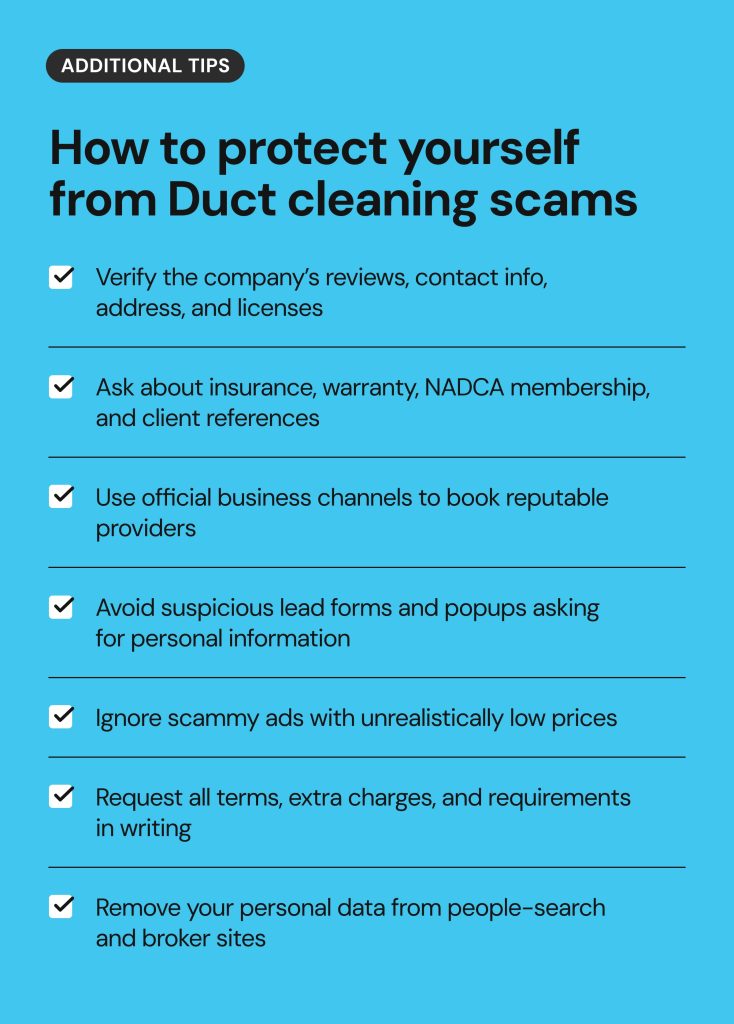
What to do if you fell victim to a duct cleaning scam
If you get scammed by a fake duct cleaner, your first instinct might be to keep talking to the “company” and request a refund. This is exactly what they want—to keep you hooked and potentially get more money or information from you. But the safest move is to cut them off completely and report the scam:
- Stop communicating with the scammer.
- Document everything to use in your scam report—keep ads, receipts, messages, emails, and phone numbers.
- Contact your bank or credit card company to dispute the transaction, if you transferred any money to the scammer. If it was a Zelle scam or you used a similar instant payment service, you might have difficulty getting your money back, however.
- Report to authorities. If you’re in the U.S., you can report scammers to the Better Business Bureau, Federal Trade Commission, and NADCA.
- Protect your affected accounts by changing passwords and enabling two-factor authentication. If you shared your payment card data in an online form, consider blocking and reissuing the card to avoid losing funds.
- Warn others. Share your experience in your local community groups and online forums related to scams in your area to alert your neighbours so they can avoid falling victim to the same exploits.
FAQs
Are all Facebook duct cleaning ads scams?
Not all Facebook duct cleaning ads are scams, but those with too-good-to-be-true prices almost always are. Before booking a service, always verify the company’s credentials independently.
How can I tell if a duct cleaning company is legit?
Check the duct cleaning company’s license, insurance, physical address, and independent client reviews. Verify their presence on local business directories. A legitimate company also won’t push for immediate payments or use fearmongering to close a sale.
How do scammers get my contact information?
Duct cleaning scammers may find their targets’ contact information online through data brokers and people-search websites. Consider removing your personal records from these sources using an automated service like Onerep.
Can scammers get my info just from filling out a quote form?
Yes, scammers can obtain your personal information from a quote form. They can then sell or misuse this data, including to steal your identity.
What should I do if I was scammed by a fake duct cleaning service?
If you’ve fallen victim to a duct cleaning scam, stop communication and report the scam to authorities. If you shared your payment details, report the potential fraud to your bank and cancel the transaction. Consider strengthening the security of your online accounts by changing your passwords.


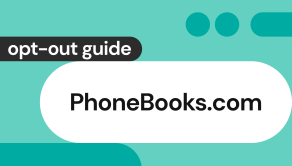
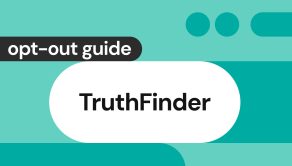

Mikalai is a Chief Technical Officer at Onerep. With a degree in Computer Science, he headed the developer team that automated the previously manual process of removing personal information from data brokers, making Onerep the industry’s first fully automated tool to bulk-remove unauthorized profiles from the internet.